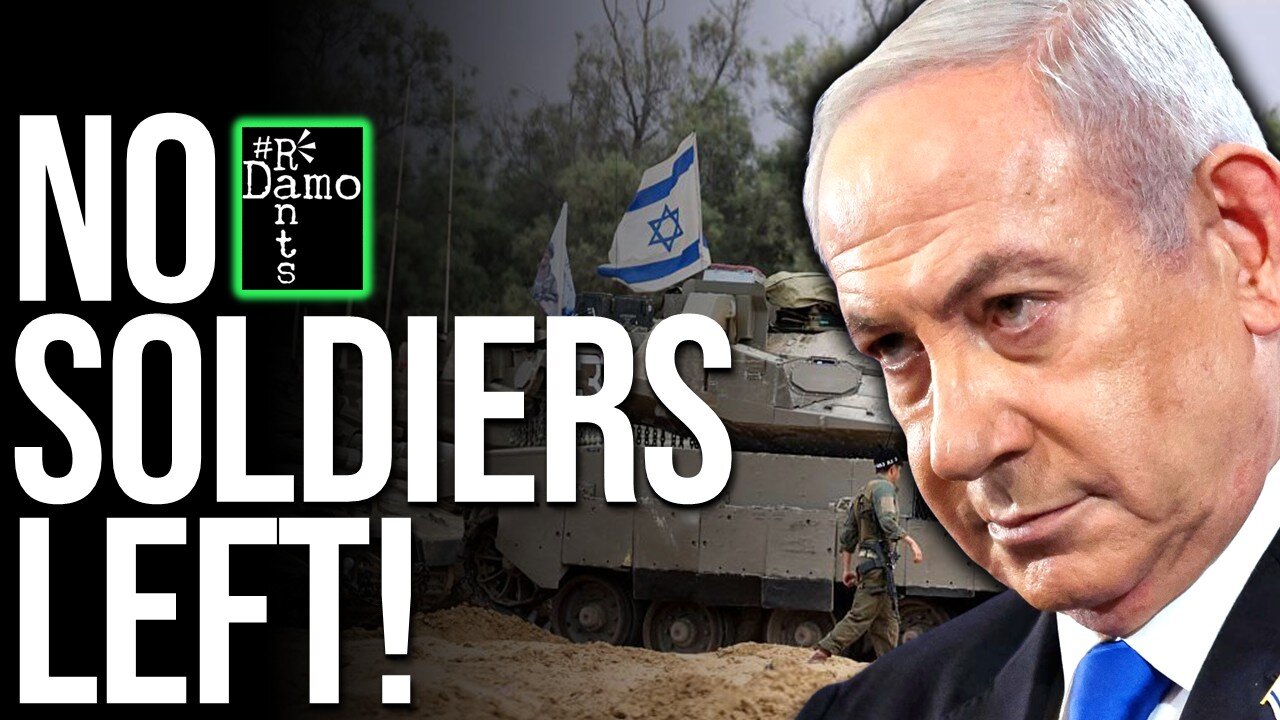Premium Only Content

Israel Assumed Lebanon Would Submit — But It Didn’t Go As Planned
Right, so Israel's latest demand that Lebanon disarm Hezbollah is as empty as their promises of military dominance. With 12,000 soldiers short, the IDF is already overstretched, relying on reluctant reservists and mentally exhausted troops. Israel wants Lebanon to hand over Hezbollah’s weapons, but the reality is Israel can’t even handle its own military crisis, let alone another war with Hezbollah. The idea that Israel could wage a successful campaign in Lebanon is as laughable as their claims of being prepared for it. Hezbollah’s military capability, entrenched in Lebanon and backed by powerful regional allies, makes any Israeli threat sound more like a desperate bluff than a viable military objective. Lebanon’s resistance isn’t just possible—it’s practically inevitable, because Israel’s out of gas and Hezbollah isn’t going anywhere. So the Lebanese government should stand their ground here, because Israel really can’t do much about it.
Right, so Israel’s repeated demand for Lebanon to disarm Hezbollah isn’t just an exercise in military posturing—it’s an empty threat, one that Israel is not in a position to enforce. The Israeli military is overstretched, exhausted, and under-resourced. With the ongoing conflict in Gaza sapping its manpower and resources, Israel simply cannot afford another war on its northern border. Hezbollah is no push-over, not just a group of guerrillas, but a formidable political as well as military force, regardless of your views of them. For Lebanon, resisting Israel’s demands isn’t just wise—it’s necessary, because Israel lacks both the military capability and the political will to escalate into Lebanon.
The state of Israel’s military is one of deep crisis. The IDF is under-equipped, stretched thin, and facing significant personnel shortages. Current reports indicate that Israel is 12,000 soldiers short, a number that cannot be easily addressed abnd they’ve been trying. The reservist system, once a dependable fallback, is now a liability, with many soldiers unwilling to serve due to exhaustion, the mental toll of the war, and the growing number of suicides within the ranks. The reality is that Israel’s military manpower is significantly diminished. Its forces are overstretched, and even if the country were to mobilise more troops, it would be sending soldiers who are already mentally exhausted and mentally unprepared to face the kind of prolonged engagement that would be required for an invasion of Lebanon.
Israel’s reliance on reservists exposes a fundamental weakness in its military readiness. These are civilians, pulled back into service after being away from the frontlines, not battle-hardened soldiers who have been continuously engaged in combat. The current situation in Lebanon isn’t a long-running conflict—it’s supposed to be a year-long ceasefire. A ceasefire that Israel has repeatedly violated with its military incursions. The expectation of peace is being undermined by Israel’s actions, further complicating any potential escalation into Lebanon. The reserves may not be willing to return to a front that, in theory, isn’t even supposed to exist right now. The real question is whether Israel can hold onto any semblance of military readiness when its forces are forced to return to the battlefield in a situation they should have left behind them now. The pressure on these reservists is immense. Reports indicate that many are refusing to return to the frontlines, a trend that signals the breakdown in Israel’s military cohesion, just one more aspect of that. This is not the sign of a force ready for another war. Israel cannot expect to simply muster the forces to invade Lebanon when its military is already struggling with the burden of Gaza.
The toll on Israeli soldiers for as much as many of you likely won’t care one iota, has nevertheless been devastating and that matters from the point of efficiency for Israel. Rising suicide rates, desertions, and a general sense of mental exhaustion have plagued the Israeli Defense Forces. The relentless pace of the Gaza genocide, combined with the growing psychological scars of the soldiers, has made Israel’s military vulnerable. The moral collapse within the ranks is not a hidden crisis—it is public. Soldiers are breaking, not just physically but mentally, and their unwillingness to engage in another front is evidence of this. Any escalation into Lebanon would only exacerbate these issues, leading to more mental trauma, more desertions, and further military dysfunction. This is not a force capable of confronting Hezbollah, if they return to arms in the rugged terrain of southern Lebanon. Following the 2024 ceasefire, Hezbollah withdrew its fighters from southern Lebanon and downed its weapons, allowing the Lebanese government to fully assume control of the region. This marked a significant shift in Hezbollah’s operations, with the group choosing not to maintain an active military presence in the south. Instead, Hezbollah's role has transitioned to a supporting position in Lebanon’s broader political landscape, particularly within the Shia community, while respecting the government’s oversight. The ceasefire and subsequent peace agreements enabled the Lebanese state to manage security, while Hezbollah refrained from military activities along the border, reducing the direct threat to Israel from this region. Hezbollah’s focus now is on its political influence and regional defence rather than territorial control. The territorial withdrawal was part of a broader agreement designed to reduce direct military conflict along the border while ensuring Hezbollah’s role as a regional player remained intact. The group’s political power in Lebanon, however, is undiminished, and its support base within the population ensures its resilience despite the absence of a physical military presence along the Israeli border. Hezbollah’s ability to operate through guerrilla tactics remain key to its deterrence capacity against Israeli incursions though. Hezbollah is no stranger to resistance. Israel’s technological superiority, which has been a hallmark of its military strategy, is not enough to defeat Hezbollah’s warfare tactics, as they’ve demonstrated for years. The group has had years to prepare, honing its skills in guerrilla warfare and perfecting its underground networks.
But the military challenge is not Israel’s only problem. Hezbollah is deeply embedded in Lebanon’s political system. The group is not just a militia; it is a legitimate political player with significant popular support. Hezbollah holds seats in the Lebanese parliament, and its influence spans across Lebanon’s Shia population and beyond. Disarming Hezbollah would be a direct assault on Lebanon’s sovereignty. The consequences would be immediate and catastrophic—not just for Hezbollah but for the Lebanese people who see the group as a protector against Israeli aggression that the Lebanese army is incapable of emulating. For Lebanon, any attempt to disarm Hezbollah would be a direct challenge to the country’s political stability and social cohesion. This is not a matter of military strategy alone—it is a political and existential struggle. If Israel escalates its demands and resorts to military action, it risks destabilizing Lebanon and forcing Hezbollah into an even stronger position of resistance, with popular mobilization behind it.
But even if Israel were to overcome Hezbollah’s military and political presence, it would still face the problem of regional consequences.
Netanyahu’s government is fragile. Domestic opposition to the war in Gaza is growing, and protests are intensifying across Israel. The public’s willingness to support a war in Lebanon, especially after the losses in Gaza and indeed previously in Lebanon, which was widely seen as failure, is non-existent. Netanyahu cannot afford to open another front while the home front is in turmoil. The political fallout from expanding the conflict into Lebanon would be disastrous. Israel’s government would be unable to sustain a war that lacks popular support, and the costs—both human and political—would be enormous. The collapse of public support for Netanyahu’s leadership is a real concern. Even within his own coalition, cracks are beginning to show, and military action in Lebanon could trigger a broader political crisis in Israel.
On the international stage, Israel is already facing growing criticism. The global community is watching Israel’s actions in Gaza with increasing scepticism. The United Nations has condemned Israel’s airstrikes, and human rights organizations have been vocal in their criticism of Israeli actions. European nations, particularly those with large Muslim populations, have expressed increasing concern over Israel’s military tactics. Arab countries, once relatively quiet, are now beginning to express their dissatisfaction with Israel’s policies. Even countries that have normalized relations with Israel, such as the UAE, are now hesitant to openly support its actions, particularly if they extend beyond Gaza into Lebanon. If Israel were to escalate in Lebanon, it would face greater isolation from the international community, especially from Arab countries. This diplomatic isolation would damage Israel’s long-term strategic goals and weaken its standing in the region.
For Lebanon, holding its ground is not just an option—it is a necessity. Israel’s only chance to win in Lebanon, is through the weakness of its own leadership. Israel cannot afford to open a second front in Lebanon. Its military is stretched, its political situation is unstable, and its international reputation is on the line. Hezbollah’s military strength, its popular support, and its regional alliances ensure that Israel’s demands are impossible to meet. Lebanon’s resistance is strategically advantageous, and Israel cannot risk escalating a confrontation it is unable to win. The consequences of an Israeli escalation would be devastating not just for Lebanon but for Israel itself. In this geopolitical game, Lebanon holds the upper hand—and Israel knows it.
Of course for as much as we might talk of a ceasefire holding, the ceasefire itself is a sham and this got exposed by, as always seems to be the case, the arrogance of an Israeli official saying the quiet part out loud. Lebanon is held to the full text of the ceasefire agreement, Israel not so much. Their ongoing attacks were sanctioned by Genocide Joe Biden last year, its been a year long sham so get all the details of that story right here.
Please do also hit like, share and subscribe if you haven’t done so already so as to ensure you don’t miss out on all new daily content as well as spreading the word and helping to support the channel at the same time which is very much appreciated, holding power to account for ordinary working class people and I will hopefully catch you on the next one. Cheers folks.
-
 LIVE
LIVE
vivafrei
46 minutes agoLive with Ivan Raiklin! Jan. 6 Pipe Bomber~! Comey & Letitia James Charges Dropped! AND MORE!
1,368 watching -
 LIVE
LIVE
The Quartering
1 hour agoCandace Owens Assassination Plot, Fat Acceptance Is Over, James Comey Indictment Thrown Out
5,760 watching -
 LIVE
LIVE
TheSaltyCracker
1 hour agoSALTcast 11-24-25
3,330 watching -
 7:51
7:51
Dr. Nick Zyrowski
6 days agoHow To Starve Fat Cells - Not Yourself!
36.4K6 -
 1:11:53
1:11:53
DeVory Darkins
2 hours agoBREAKING: Hegseth drops NIGHTMARE NEWS For Mark Kelly with potential court martial
91.6K43 -
 LIVE
LIVE
Dr Disrespect
4 hours ago🔴LIVE - DR DISRESPECT - ARC RAIDERS - BLUEPRINTS OR DEATH
2,534 watching -
 1:10:26
1:10:26
Sean Unpaved
3 hours agoJalen Hurts & Eagles COLLAPSE In LOSS vs. Cowboys | UNPAVED
16.5K2 -
 2:00:25
2:00:25
Steven Crowder
6 hours agoNo Influencer Safe: New X Update Exposed A Major Psyop
422K260 -
 17:38
17:38
Professor Nez
3 hours agoTHIS will HAUNT Jasmine Crockett for Years...
14.9K20 -
 56:36
56:36
The Rubin Report
4 hours agoTense Moment at Trump-Mamdani Meeting That No One Predicted
46.7K73